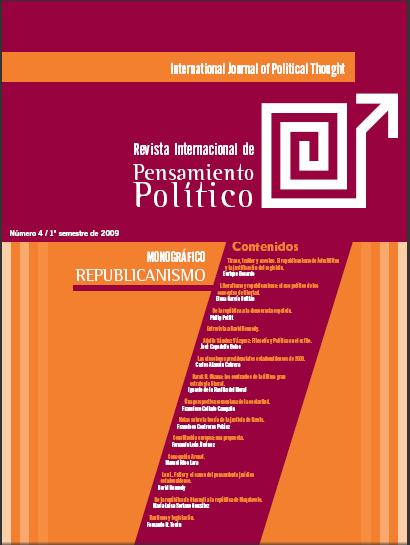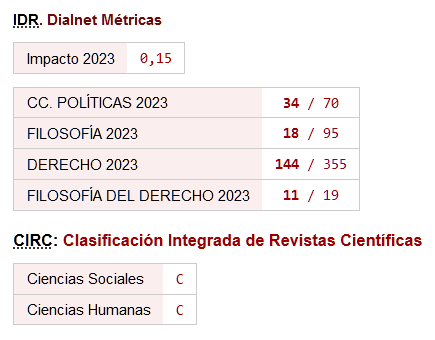Kantismo y Legislación
DOI:
https://doi.org/10.46661/revintpensampolit.1801Palabras clave:
Estado del Bienestar, mercado , Rawls , giro moral , KantResumen
El artículo define y analiza la patología filosófica llamada Giro Moral, a saber, la suposición de que es posible resolver a priori complejos problemas socio-económicos mediante la simple aplicación de principios morales abstractos, sin conceder la debida atención a lo que las ciencias sociales (especialmente, la economía) enseñan acerca de las circunstancias del problema, las consecuencias previsibles delas diversas soluciones institucionales posibles, etc. El pensamiento de Kant con su característico desdén hacia todo lo empírico- constituye el origen probable de este fallo discursivo. Y en la filosofía contemporánea proliferan pensadores -neokantianos-, convencidos de que una vez que descubrimos o formulamos los valores correctos, podemos recomendar leyes e instituciones concretas (sin necesidad de información empírica): así, Rawls deduce sin más de su principio de la diferencia (que ordena la promoción de los peor situados) la deseabilidad de un Estado intervencionista-redistributivo, sin prestar atención a informes empíricos que muestranque el libre mercado podría conseguir ese objetivo promocional más eficazmente.
Descargas
Citas
Brown, Stuart M. “Has Kant a Philosophy of Law?” The Philosophical Review 71 (1962): 47. DOI: https://doi.org/10.2307/2183679
Edward Freeman, R., and William M. Evan. 1990. "Corporate governance: A stakeholder interpretation". The Journal of Behavioral Economics. 19 (4): 337-359. DOI: https://doi.org/10.1016/0090-5720(90)90022-Y
Flikschuh, Katrin. 2000. Kant and modern political philosophy. Cambridge: Cambridge University Press, p. 86. DOI: https://doi.org/10.1017/CBO9780511487187
Holtman, Sarah Williams. 1999. "Kant, Ideal Theory, and the Justice of Exclusionary Zoning*". Ethics. 110 (1): 32-58. DOI: https://doi.org/10.1086/233203
Kant, Immanuel, and Mary Gregor. 1991. The Metaphysics of morals. Cambridge: Cambridge University Press.
Pincione, Guido, and Fernando R. Tesón. 2011. Rational choice and democratic deliberation: a theory of discourse failure. Cambridge: Cambridge University Press.
Tesón, Fernando R. 1998. A philosophy of international law. Boulder: Westview Press.
Descargas
Publicado
Cómo citar
Número
Sección
Licencia
Derechos de autor 2016 Revista Internacional de Pensamiento Político

Esta obra está bajo una licencia internacional Creative Commons Atribución-NoComercial-CompartirIgual 4.0.
Política de acceso abierto
Se permite el acceso libre y abierto de cualquier interesado a todos los contenidos de los números de la revista, sin costo alguno, pudiendo imprimir y trasladar todos los artículos, con la única condición de precisar la fuente y la autoría.
La revista: a) no cobra a las autorías costes por el procesamiento de los artículos ni por el envío de los mismos, b) mantiene el copyright para los autores sin restricciones, c) facilita a los autores conservar sus derechos de publicación sin limitaciones.
La Revista Internacional de Pensamiento Político es una obra original del Laboratorio de Ideas y Prácticas Políticas de la Universidad Pablo de Olavide. Todos los artículos incluidos en la Revista son obra original de sus respectivas autorías. Esta Revista se ofrece libremente a la comunidad científica y académica sin coste alguno y libera los contenidos de acuerdo a la licencia "Reconocimiento-NoComercial-CompartirIgual 4.0 CC BY-NC-SA" del proyecto Creative Commons dispuesta en la siguiente url: https://creativecommons.org/licenses/by-nc-sa/4.0/legalcode
Si deseas traducir o compilar alguno de los artículos aquí disponibles, por favor, ponte en contacto













